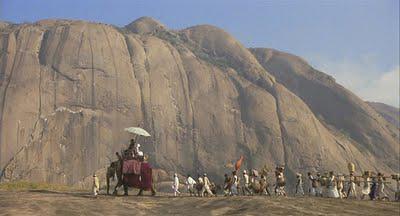 An adventurous young woman (Judy Davis) travelling with her mother-in-law to be (Peggy Ashcroft), arrives in post WWI India to be with her magistrate fiance (Nigel Havers) and explore the country. Among the people they encounter include a British educator (James Fox), a Brahmin teacher (Alec Guiness), and a genteel Indian doctor (Victor Banerjee) with whom the women become friendly. The doctor invites them to a picnic at the bizarre Marabar Caves, and their excursion turns unfortunate and sparks and national incident with brings out the worst in both the British and Indian people in colonial society. David Lean's adaptation of E.M. Forster's 1924 novel was the last he ever made, and is as beautiful and sumptuous as any of his great epics. Lean and cinematographer Ernest Day capture the beauties of India in spectacular fashion. Judy Davis is marvelous in a complex lead role and Peggy Ashcroft supplies fine support in an Academy Award winning role (she is the oldest recipient in the Supporting Actress category). James Fox is very good as a conflicted Englishmen, Alec Guiness is amusing in an aloof role, and Victor Banerjee is exceptionally good as a man who entirely changes allegiances between the beginning and end of the film. "A Passage of India" is a movie that lives outside of its time and feels like a Technicolor wonder of the 50s. It is an appropriate swan song for Lean's matchless career.
An adventurous young woman (Judy Davis) travelling with her mother-in-law to be (Peggy Ashcroft), arrives in post WWI India to be with her magistrate fiance (Nigel Havers) and explore the country. Among the people they encounter include a British educator (James Fox), a Brahmin teacher (Alec Guiness), and a genteel Indian doctor (Victor Banerjee) with whom the women become friendly. The doctor invites them to a picnic at the bizarre Marabar Caves, and their excursion turns unfortunate and sparks and national incident with brings out the worst in both the British and Indian people in colonial society. David Lean's adaptation of E.M. Forster's 1924 novel was the last he ever made, and is as beautiful and sumptuous as any of his great epics. Lean and cinematographer Ernest Day capture the beauties of India in spectacular fashion. Judy Davis is marvelous in a complex lead role and Peggy Ashcroft supplies fine support in an Academy Award winning role (she is the oldest recipient in the Supporting Actress category). James Fox is very good as a conflicted Englishmen, Alec Guiness is amusing in an aloof role, and Victor Banerjee is exceptionally good as a man who entirely changes allegiances between the beginning and end of the film. "A Passage of India" is a movie that lives outside of its time and feels like a Technicolor wonder of the 50s. It is an appropriate swan song for Lean's matchless career.
Movies Magazine
 An adventurous young woman (Judy Davis) travelling with her mother-in-law to be (Peggy Ashcroft), arrives in post WWI India to be with her magistrate fiance (Nigel Havers) and explore the country. Among the people they encounter include a British educator (James Fox), a Brahmin teacher (Alec Guiness), and a genteel Indian doctor (Victor Banerjee) with whom the women become friendly. The doctor invites them to a picnic at the bizarre Marabar Caves, and their excursion turns unfortunate and sparks and national incident with brings out the worst in both the British and Indian people in colonial society. David Lean's adaptation of E.M. Forster's 1924 novel was the last he ever made, and is as beautiful and sumptuous as any of his great epics. Lean and cinematographer Ernest Day capture the beauties of India in spectacular fashion. Judy Davis is marvelous in a complex lead role and Peggy Ashcroft supplies fine support in an Academy Award winning role (she is the oldest recipient in the Supporting Actress category). James Fox is very good as a conflicted Englishmen, Alec Guiness is amusing in an aloof role, and Victor Banerjee is exceptionally good as a man who entirely changes allegiances between the beginning and end of the film. "A Passage of India" is a movie that lives outside of its time and feels like a Technicolor wonder of the 50s. It is an appropriate swan song for Lean's matchless career.
An adventurous young woman (Judy Davis) travelling with her mother-in-law to be (Peggy Ashcroft), arrives in post WWI India to be with her magistrate fiance (Nigel Havers) and explore the country. Among the people they encounter include a British educator (James Fox), a Brahmin teacher (Alec Guiness), and a genteel Indian doctor (Victor Banerjee) with whom the women become friendly. The doctor invites them to a picnic at the bizarre Marabar Caves, and their excursion turns unfortunate and sparks and national incident with brings out the worst in both the British and Indian people in colonial society. David Lean's adaptation of E.M. Forster's 1924 novel was the last he ever made, and is as beautiful and sumptuous as any of his great epics. Lean and cinematographer Ernest Day capture the beauties of India in spectacular fashion. Judy Davis is marvelous in a complex lead role and Peggy Ashcroft supplies fine support in an Academy Award winning role (she is the oldest recipient in the Supporting Actress category). James Fox is very good as a conflicted Englishmen, Alec Guiness is amusing in an aloof role, and Victor Banerjee is exceptionally good as a man who entirely changes allegiances between the beginning and end of the film. "A Passage of India" is a movie that lives outside of its time and feels like a Technicolor wonder of the 50s. It is an appropriate swan song for Lean's matchless career.

